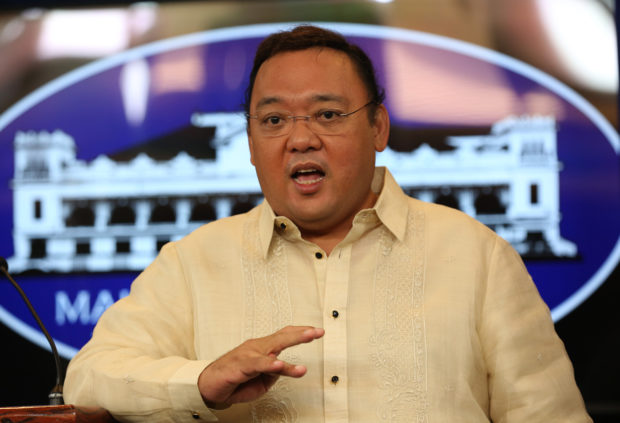
Presidential spokesperson Harry Roque gestures during media briefing held in New Executive Bldg, Malcañan, Thursday. INQUIRER PHOTO/JOAN BONDOC
There is no reason to fear a return to a dictatorship, presidential spokesperson Harry Roque said on Thursday after President Duterte acknowledged that martial law throughout the Philippines remained an option for him.
Roque said the country’s experience with martial law in Mindanao showed that it was not like military rule during the administration of the late dictator Ferdinand Marcos.
That period was marked by human rights abuses, the disappearance of dissenters and the plunder of the national coffers.
‘No legal basis’
“I think we have shown for the entire period that martial law has been imposed in Mindanao that this is not the same martial law that we had in 1972. Courts remain functioning, Congress remains existing, the Bill of Rights and the Constitution are enforced,” Roque told reporters.
“So I don’t think there has been any legal basis for the fears of many that there will be [a] return of dictatorial rule. Neither has there been any systematic or gross violations of human rights so far,” he added.
In Mindanao, the military takes precedence over civilian rule, Roque said, but local governments continue to function.
“We are not exactly exploiting that and no local government unit has actually complained even in Marawi that they fear that their mandates have been violated. Even in Marawi itself, the local government unit continues to exist and the local mayor himself takes the initiative on the rebuilding of Marawi,” he said.
“So these are powers that could be used but have not been exploited by [the] government so far,” Roque added.
As for Mr. Duterte’s statement that all options are on the table when he was asked about martial law throughout the country, he said the President just stated the options available to him under the Constitution in fighting terrorism and the threat of a communist takeover.
Extension approved
“Of course, martial law is always an option because it is one of the three extraordinary powers of the President as Commander in Chief. So, if there’s factual basis then he can impose martial law nationwide. But that’s what he meant by possibility. It’s there in the Constitution. So it could always be utilized by the Commander in Chief,” Roque said.
Congress on Wednesday granted Mr. Duterte’s request to extend martial law and the suspension of the privilege of the writ of habeas corpus in Mindanao by a year.
Security officials have said, however, that the extension may be lifted early if the security threats are quelled before the deadline is up.
Gen. Rey Leonardo Guerrero, chief of staff of the Armed Forces of the Philippines, said on Thursday that the extension was not a prelude to a declaration of martial law throughout the Philippines.
“We’re not thinking of nationwide martial law, because what’s important to us is the declaration in Mindanao only. That’s our focus,” Guevarra told journalists in Lucena City.
He said martial law in Mindanao would “give the government forces the operational space and environment” to sustain the campaign against the remnants of the Islamic State (IS)-inspired terrorists who laid siege to Marawi City in May, communist New People’s Army (NPA) rebels and other lawless groups on the island.
The ‘objective’
That is a confirmation of the belief of Jose Maria Sison, founder of the Communist Party of the Philippines (CPP), that the extension of martial law in Mindanao was aimed at the CPP and its armed wing, the NPA.
Sison, in a statement from Utrecht, the Netherlands, on Thursday, said the extension was a prelude to placing the entire Philippines under martial law.
“The objective of the US-Duterte regime is to destroy the CPP and the NPA before the end of 2018 by first concentrating attacks on the guerrilla fronts in Eastern Mindanao and elsewhere in Mindanao and then on guerrilla fronts in Luzon and the Visayas upon the expansion of martial law nationwide,” Sison said.
He said the government was overestimating the strength of the military and its capability to cover the entire country.
Mr. Duterte declared the CPP and the NPA terrorists organizations on Dec. 5 after the collapse of peace talks between his administration and the communist rebels.
Mr. Duterte first imposed martial law and suspended the privilege of the writ of habeas corpus in Mindanao on May 23 after IS-inspired terrorists rampaged through Marawi and seized large parts of the city to establish an enclave of the jihadist group in Southeast Asia.
He declared the city liberated five months later, but did not immediately lift martial law, which was first extended to Dec. 31, 2017. —WITH REPORTS FROM NIKKO DIZON AND DELFIN T. MALLARI JR.

